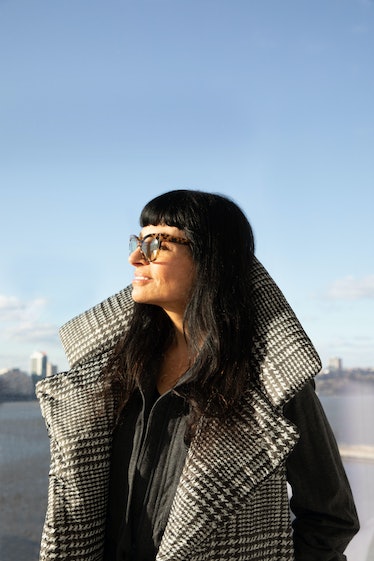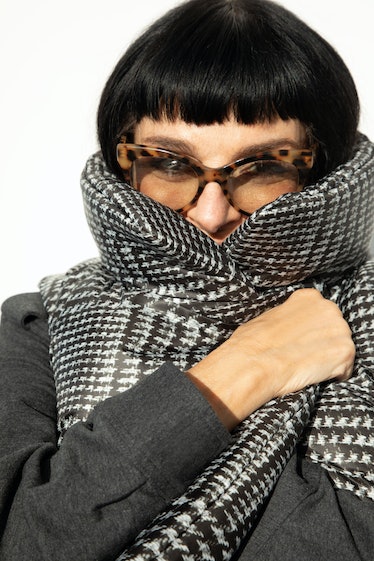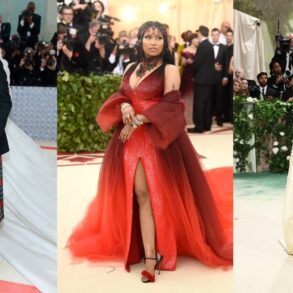Amid the fast-and-furious game of creative director musical chairs dominating the fashion world, one woman remains a constant—as she has for over 55 years. That’s Norma Kamali, the Manhattan-born designer who, at the age of 78, is just as energetic and bubbling with ideas as she was when she first opened her boutique on East 53rd street in 1967. Fashion remains a cornerstone for Kamali, who continues to put out four collections a year, but somehow, the designer has been finding time between all that to explore her other, non-aesthetic interests as well. These days, she has turned her attention to medicine and technology—specifically artificial intelligence—and the ways in which the fashion industry can benefit from such advancements. While many septuagenarians give up any attempt to grasp modern technology the second they’re faced with an iPhone screen, Kamali is not only embracing change, but fueled by it. This year, she enrolled in a course at MIT to learn about generative AI from the experts, returning to her new SoHo headquarters upon completion with a company-wide game plan.
“I want to live a long, healthy life in the best way I can, within the confines of my genetics,” she tells W over the phone. If you’re curious what that has to do with fashion, or even artificial intelligence, she’ll be happy to connect the dots on her new podcast, the AI-titled Invincible Threads, where she shares her findings with the world. “I’ve taken courses, I’ve had mentors, and now I’m meeting with doctors and researchers, so it feels like the right time to make this podcast and provide high-level, up-to-the-minute information about medicine and technology.”
Hi. How are you?
I am good. If it wasn’t so close to getting the collection done, I wouldn’t be stressed. How many years can you possibly do this and still feel like it’s the worst collection you ever did? Though by the time it’s done, and gone through a transformation, I won’t hate it anymore. I’ve been doing this 56 years, and I still go through that process. That was my discovery before this call. I was looking at the collection and thinking, “What the hell?”
I guess that just means you haven’t lost your critical edge. Anyway, I would say congratulations, as you have a lot going on right now, but I have a feeling that’s always the case.
I’ve been in exactly the same job for all these years. The secret is to keep adding new things and create different experiences. There are people that say to me, “Norma, you’re asking me to do something I’ve never done before.” And I say, “Welcome to my world. That’s every day for me.” If I’ve done it before, it’s not going to be as exciting as discovering something completely new. That’s the secret to keeping an adventurous attitude about your work.
Has there ever been a time in your life when you were content to do the same thing repeatedly?
It’s almost like a drug: every time something magical happens while you’re working, you feel lifted, like that experience took you to another level. It’s addictive because you wonder, can that happen again? And it can. But there are people who prefer the stability and the comfort of repetition, and I understand that, too. That can be meditative. But in the end, I love the element of the prize.
Tom Ford, who is 62, recently said, “Designers rarely change the world of fashion at 62,” which is one of the reasons why he’s stepping away from his label. Do you agree with that sentiment?
No, no. Absolutely not. I don’t feel that way at all. That’s fascinating. I’m so surprised he would say that. First of all, I look at my job as being in service to women in everything I do. I loved when I finally understood that fashion and clothing could actually affect a person’s life in a positive way—that it could change how people feel about themselves. So it’s part of a purpose, more than just a singular take on fashion.




You told WWD that fashion is going through “the biggest change” that you’ve experienced in your lifetime. How so?
There are some obvious things like social media and e-commerce. As a designer, to be able to communicate directly with people who are connecting in some way to what I do, and to see them wearing my clothes is so great. In the past, I would see photographs of my clothes on celebrities in magazines, but now, so many people post pictures of themselves in my clothes. I see how they accessorize a piece, where they’re wearing it, the whole picture. It gives me such insight into who I’m dressing.
Technology is moving so quickly and the way we show clothes, sell clothes, buy clothes, present clothes—it’s all going to move faster and faster every month. And obviously, AI will change so much of our lives.
And you see these changes happening and say, “OK, let’s go to MIT to understand it better.”
Of course, the world is not perfect, but this is the golden age of technology and medicine. I’ve had amazing doctors and researchers on my podcast, and my breath is taken away every time I hear of the discoveries made. So many of my interviews are with women at the forefront of stem cell research and other medical discoveries. Listening to these women talk about medicine in this very progressive way is exciting. To me, the best outcome would be providing medicine that everybody could afford, equal types of care for everyone. Isn’t that beyond brilliant?
When were you first introduced to the concept of AI?
I’ve had interest in [virtual reality] and [augmented reality], and I think through them, I learned about AI. When I finished my MIT course, I came back and encouraged all my staff to download ChatGPT and start using it. I said, “Give it a prompt, see what it comes up with, and how it compares to what you came up with on your own. Start to use it as a sidekick, as a way to enhance your work and also enhance your productivity.” Everybody jumped on it.
There is a lot of hesitancy around AI, and the fear it could take creative jobs. What are your feelings about that?
I think there’s absolutely truth to that. When we stopped using a horse and buggy and developed cars, some jobs were left behind. Every time we make progress, some things are negatively affected—and that is problematic. But the hope is that more opportunities will come about through new technology, and jobs we never dreamed of will open up.
I do believe, though, that there are people who are afraid of AI and shouldn’t be. The more they learn about it, the more they can realize that, while there are creative aspects to AI, AI is not going to be creative. AI can be your assistant, it can do research for you, which in turn will provide you with more time to be creative.
Is “retirement” a dirty word in your book?
I don’t really think about retirement. I can’t imagine what that would mean for me. I am so into structure, and after many years of tight deadlines for deliveries and collections, I thrive off them. I would need to be creating deadlines no matter what I’m doing.
This post was originally published on this site be sure to check out more of their content.







